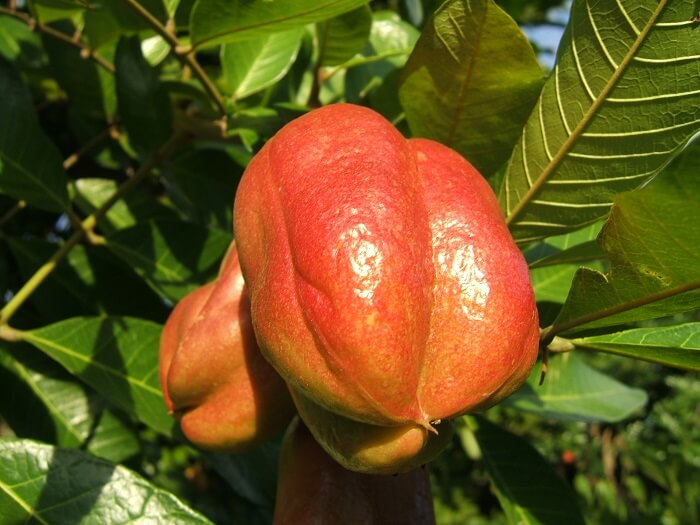Jamaican vomiting sickness is a very serious condition that causes abdominal discomfort. This condition can cause electrolyte imbalance and even death. Fortunately, this illness is entirely preventable with just a bit of knowledge and careful preparation for most users. We will check the primary causes of this illness and how it can be prevented. In addition, we will offer several tips to help you prevent Jamaican vomiting sickness for you and your family.
Jamaican Vomiting Sickness Overview and Cause

Unripe Ackee fruit
Jamaican vomiting sickness, also known as ackee fruit toxicity, is an illness that progresses from rising levels of hypoglycin A and hypoglycin B in the body. The primary compounds listed above are metabolized into MCPA. Unfortunately, this compound has a negative impact on the body’s ability to oxidize fatty acids.
It does this in two different ways. First, it disrupts the transfer of long-chain fatty acids into the mitochondria of cells. Secondly, it makes it where the body can only oxidize unsaturated fats. The result is that the body begins to rely on glucose and glycogen for its primary energy supplies. As Jamaican vomiting sickness progresses, the body begins to deplete its stores of glucose and severe hypoglycemia tens to develop.
vomiting sickness
The primary Jamaican vomiting sickness cause is from eating unripe ackee fruit resulting in ackee poisoning. The harmful chemicals mentioned before are only present in ratios of .01 ppm in fully ripe fruit. However, levels can be as high as 1,000 ppm when the fruit is unripe.
With this in mind, Jamaican vomiting sickness tends to be much more severe and progress much more quickly in small children. You should take particular care if you are feeding ackee fruit to your kids. In addition, elderly individuals who have preexisting health conditions can have a harder time with this disease as well.
Course of the Disease
In the beginning, Jamaican vomiting sickness starts with abdominal discomfort. It can start anywhere from two to six hours after the ingestion of unripe ackee fruit. Soon after, sudden vomiting begins to occur as the abdominal comfort worsens.
It’s common for the vomiting to stop briefly and then resume again suddenly. As the condition is allowed to progress, severe dehydration, seizures, and coma begin to develop. If left untreated, most patients will die from the disease.
The most important thing to remember about the course of the disease is that it progresses rapidly. In the vast majority of cases, the time of death can occur in as little as 12 and a half hours after the ingestion of unripe ackee fruit. With this in mind, seek medical care as soon as possible to ensure you increase your chances of survival.
Jamaican Vomiting Sickness Treatment
Thing to remember about the vomiting sickness is that each treatment is customized to the severity of the illness. No matter what, it’s important that you seek medical care as soon as possible. All forms of this illness can prove fatal when left untreated. Thing to remember about vomiting sickness is that each treatment is customized based on the severity of the illness.
In addition, anti-seizure precautions are often taken as well. This may include the use of anti-seizure medications as well as securing the patient on their side to ensure their airway remains clear. In cases where levels of poisonous compounds are particularly high, doctors may decide to utilize activated charcoal as a way to help absorb and remove the chemicals.
Furthermore, patients are often given special medications called antiemetics. These medications work to combat nausea and help prevent vomiting in most patients. In cases that have progressed to the final stages of the disease, patients may need help breathing. Depending on the severity of the situation, this is accomplished with either an oxygen mask or a breathing tube.
How to Prevent Ackee Poisoning
The most important thing to remember when preventing ackee fruit poisoning is that you should always avoid unripe ackee fruit at all costs. As mentioned earlier, levels of harmful chemicals are much higher in unripe fruit.
In addition to this basic precaution, there are a number of tips to consider regarding the preparation method that can help prevent this illness as well:
- The first cooking tip to consider is that you should never use ackee fruit pods that have been forcibly opened. A pod that has been forcibly opened is likely unripe and should not be used for consumption. When in doubt, it’s best to err on the side of caution; stick with fruit that already opens.
- Ackee fruit is boiled as part of its basic preparation. So, the next tip focuses on boiling the fruit correctly each time. It’s important that the fruit is allowed to vigorously boil each time. During the cooking process, the toxins are leached out of the fruit and into the water. This is why you should always remember to dispose of the cooking water and not use it in any other recipes.
- In addition, once the fruit has been boiled the first time and the water discarded, it’s best to boil it once again. To do this correctly, rinse the fruit off before beginning the second boiling attempt; make sure you are using fresh water. In some cases, many users use a bit of salt in the water at this step to enhance the flavor of the fruit.
- As in the prior step, dispose of the water when the fruit is done cooking. It’s also important to remember that you should always dispose of the rind and seeds responsibly; these parts contain large amounts of harmful compounds.
Final Thoughts
Though Jamaican vomiting sickness is a serious condition, it is entirely preventable with just a bit of prior planning and careful consideration. Remember to always use ackee fruit that is fully ripe. Never force the pods of the fruit to open when cooking the fruit.
By taking additional steps like discarding the cooking water and boiling the fruit a second time, you can further decrease your chances of getting sick. Just remember to always seek out the help of a medical professional in the event you believe you are experiencing signs of this serious condition.
